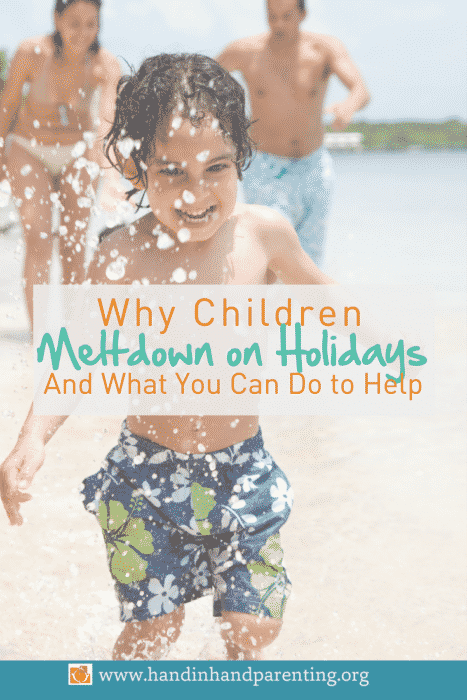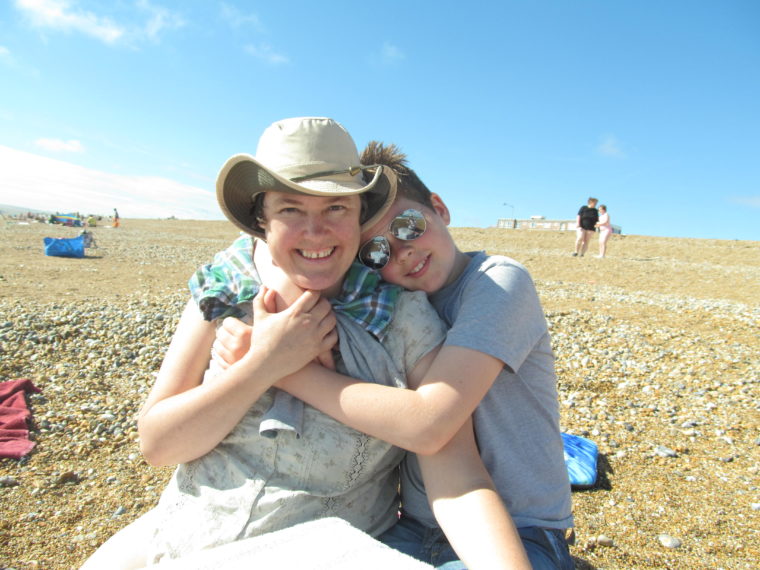![]()
Your child will have big feelings when a special holiday or birthday comes up. It's one of the phenomena you can set your clock by. We parents wish the universe were governed by forces a little easier on us than this one.
But it may help to know that every other family deals with the same phenomenon you do, and that, in a way, children are built to have big feelings on big occasions.
Why Do Children Cry When Times are Good?
 Why? There are several reasons that work together. First, when any holiday or birthday rolls toward a family, it puts extra demands and stress on the parents, and the children tend to become infected with stress too.
Why? There are several reasons that work together. First, when any holiday or birthday rolls toward a family, it puts extra demands and stress on the parents, and the children tend to become infected with stress too.
They get less relaxed time with us, and have more expectations of “good behavior” put on them in stores, at homes they're not familiar with, on the road, in new places and with people they may not know well.
And second, children's hopes soar in anticipation of a special occasion. They look forward to the extra attention, to extra fun, to special times.
And when hopes are high, both children and adults can feel disappointments much more acutely.
A third factor is the principle that the greater the number of loving family and friends gathered in one place, the higher children's feelings rise. When away on holiday having two parents, or, even better, cousins, aunts, uncles or grandparents a children's sense of safety zooms to new highs. They have a comfort cradle in which to let their pent up doubts, annoyances and fears fly free.
Children tend to do the very best they can to cooperate and to flex, but then they hit the wall. They can't go another moment without exploding in feelings. These meltdowns often happen in public places, when the family gathers, or at some other highly inconvenient time for you, the parent.
Either a sibling will touch a sacred toy, or a spill of juice will bring a huge cry, or who sits next to whom at a restaurant will be the cause for a tantrum.
It happens in every family, every holiday, because it must. Children full of tension just have to let it out. Their systems have a built-in “emotion ejection system” designed especially for the moments when they just can't think any longer. When they're done releasing the bad feelings, they can be reasonable, thoughtful, and flexible again.
It helps to be prepared
Just as you are in the habit of preparing yourself for the quirks in your relatives' behavior, you can prepare to handle your child's meltdown. When you see that things are getting tense, you can move toward the tension, instead of away from it. You set yourself up for disappointment every time you think, “Maybe this time, he'll calm down all by himself.”
Move toward a tense child to play with him for five or ten minutes before leaving for Grandma's, eliciting as much laughter as you can (without tickling) so he feels more connected to you. Or gently but firmly set a limit if his behavior has already gone off track. After you set the limit, stay with him and gently assist him to release the upset through crying or tantrums. Hold the limit and love the child.
What children need is simple
 They need the chance to have their cry, express their disappointment, tantrum fully, or laugh a good while. When they're done, they can feel your love again. They notice the needs of the people around them, and show their genius for loving and living life well. Children's need to cry is as wholesome as their need for sleep; ejecting passionate feelings keeps their minds in good working order.
They need the chance to have their cry, express their disappointment, tantrum fully, or laugh a good while. When they're done, they can feel your love again. They notice the needs of the people around them, and show their genius for loving and living life well. Children's need to cry is as wholesome as their need for sleep; ejecting passionate feelings keeps their minds in good working order.
They're not crying to embarrass or manipulate you, they're crying to offload bad feelings so they can feel better again. The fact that the meltdown happens often in public may indicate that life has been going so fast in private that they couldn't find a way to catch your attention there.
Prepare for criticism from others
Very few people understand how healthy a good cry or tantrum is for a child, and how deeply it improves a child’s behavior to have the parent listen and care through the storm. You don't need to bow to other people’s worry or disapproval. If you’re in a public place, you’re not in charge of making sure that every passerby has a mellow day. With your family, you know who will be upset, so think ahead of time about what you might want to say. “Well, at least he's doing a good job of getting this out,” “We'll go into the back room so you don't all have to hear about it,” “She's been needing me to listen to her all day,” or “This will be over in a little while. Save some ice-cream for us!”
For more on dealing with differences in parenting approach, read When Your Family Don't Like How You Parent
We need some time to express our feelings, too

Holiday expectations are often a heavy load for parent. We need to find a caring adult who can help us take the edge off our frustration, anger, or other feelings that special occasions trigger for us. When you don't have a listener handy, but your feelings are close to the surface, it can work to play music that moves you, call a good friend, or rent a movie you know will let you cry. Your mind will release the tensions that pinch if you can find a way to allow yourself a good healthy meltdown, too.
We also recommend taking the pressure off yourself. Your holiday doesn’t have to look like anyone else’s. You have the right, and the opportunity, to decide ahead of time what makes sense for you and your family. Rather than dragging yourself and your family through all the expected rituals, you can decide what kinds of things you want to do, and will work for you, and what won’t. You can postpone trips, visit relatives at less difficult times. You can schedule Special Time every day during the busy times, so that your children have the sense of connection they need to operate on a more even keel.
Holidays and meltdowns go together like peanut and jelly. New surroundings, new people, a different schedule, makes them all but unavoidable. Sometimes, seeing the tantrum through to the end is all you can do – and the best thing you can do. Here's how it worked for one mom who went on vacation with a friend and her children. Setting Limits: Saying No To The Yellow Bowl Lets the Storm Cloud Lift
Dealing with tantrums from more than one child? Get help here in a guide packed with calming tips and strategies: Get my Ultimate Sibling Rivalry Survival guide